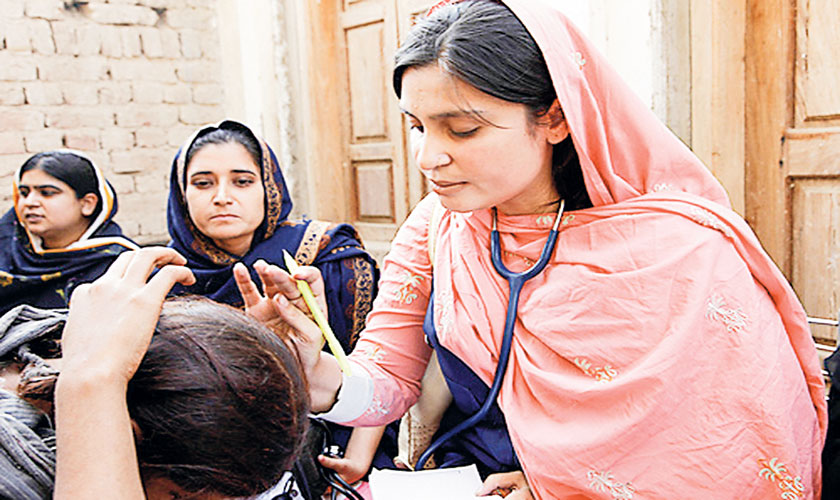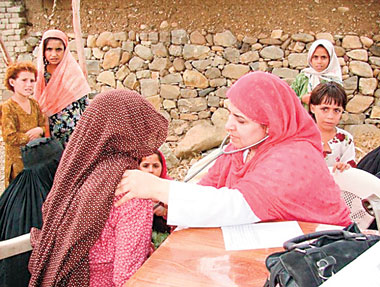Out of 80 essential drugs, 50 are no longer available in Pakistan. You! takes a look...
Out of 80 essential drugs, 50 are no longer available in Pakistan. You! takes a look...
According to World Health Organization (WHO), critical life saving drugs, essential to prevent maternal deaths during childbirth complication have vanished from open market in Pakistan - putting thousands of to be mothers’ lives at risk with an existing maternal mortality rate of 170 per 100,000. The shortage of various medicines is directly linked to the failure of the federal government to resolve pricing issues with drug manufacturers. Sadly, women especially expectant mothers are deprived of basic necessities like access to clean water, shelter, and most importantly health facilities.

What the health experts say:
Health experts from nationwide have drawn the attention of the Minister of National Health Services Regulation (NHRS) and Coordination and Drug Regulatory Authority of Pakistan (DRAP) towards the scarcity of Oxytocin and Methylergometrine Maleate drugs, which have put the lives of expected mothers at risk.
In this regard, Dr. Sarah Feroze, Gynaecologist and Obstetrician at South City Hospital, Karachi has brought to attention of the authority to resolve the issue of shortage of the above mentioned medicines to lower the rate of maternal deaths.
According to Dr Nazli Hussain, a professor of obstetrics and gynaecology at the Dow University of Health Sciences, Karachi, “The inexpensive folic acid medicine, apparently being manufactured by only one local company, has simply vanished from the market for the past six months. Unfortunately, nowadays, imported high cost alternatives of the medicine are available in the market, which makes it all the more difficult for families belonging to the lower strata of our society.”
“Folic acid is usually suggested to expecting women all over the world. Taking a proper and healthy diet along with medicines having vitamins and minerals (such as folic acid) before conception and during pregnancy minimizes the danger of some birth defects. Folic acid lowers the danger of birth shortcomings such as neural tube defects, heart and limb defects and urinary tract anomalies,” adds Dr Nazli Hussain.
The current scenario:
Various sources in health care profession and pharmaceutical industry acknowledged that production of two fundamental life-sparing medications, Oxytocin and Methylergometrine Maleate, have been stopped for almost a year now. “There were 10 organizations enrolled and permitted to deliver these medications, however, as of now just 3 are producing the life-sparing medicines,” reveals a source,
Furthermore, whatever is left of the organizations has ceased production because of high input costs. The maximum retail prices permitted by DRAP for these drugs are Rs 10 and 5, even though the foreign substitute meds cost around 1 US dollar (104 Pakistani rupees). It is quite unfortunate that out of the three, one organisation is compelled to import these life-sparing medicines at higher expenses. The said company has even decided to keep these products available at the same low and economical rates to help the suffering mothers-to-be.

The situation seems grim as the company’s decision will not be effective in the long run since importing these two products will turn out expensive. Hence, resulting in the discontinuation of the medications - this will leave women of childbearing age at the mercy of quacks and counterfeit substitutes.
Moreover, due to the poor rheostat over medicine registrations and rating has not only spoiled to certify accessibility of critical lifesaving low priced drugs but has also miserably failed to promote healthy competition to motivate other companies for producing it.
What can be done?
Following the same vein, Dr. Zubaida Masood, Associate Professor Gynae and Obs at KMDC and Abbasi Shaeed Hospital, Karachi says, “It is ironic that these essential life saving drugs during childbirth, are not available and nobody is even considering to take corrective measures. In the absence of these medicines the maternal mortality rate could increase excessively. It is up to the policy makers to ensure that the drugs are readily available in the whole country to prevent such mishaps.”
However, the federal government is yet to answer to the ever recurring alarm raised by important quarters over the scarcity of medicines, throughout the country. These drugs include important medicines to treat complex cases of tuberculosis (TB), cough and cold, thyroid diseases and neurological disorders.
Dr Javaid A. Khan, a professor of medicine and consultant physician at the Aga Khan University Hospital (AKUH), Karachi, is of the view, “The problem has been going on for six months but a crisis-like situation has occurred in the past two months. I believe that the government should offer subsidy to companies manufacturing important medicines and offering low prices so that they do not face any kind of loss. Besides, the Ministry of Health should also see the price of a particular medicine in regional countries and then set a price locally.”
Senior gynaecologist and obstetrician Dr Shershah Syed who is currently the president of Pakistan National Forum on Women’s Health (PNFWH), says, “The deficiency of folic acid could cause neural tube defect in newborns and make anaemic pregnant women vulnerable to a host of health issues. I believe, in order to make the overall health situation better in our country, it is essential that the government provides important medicines free of cost to every citizen.”
Qaiser Waheed representing the Pakistan Pharmaceutical Manufacturers Association shares, “Out of 80 medicines 50 that fall in the category of essential drugs are no longer available in Pakistan; due to delay on part of the government to resolve price issues. In the past five years, many cases related to high prices of medications have been overlooked by the government. Even officials of pharmaceutical industry are not investing their money and eventually it will be the common man who will suffer.”
On the brighter side:
However, on the flip side, the government has started taking some steps in order to resolve the shortage of life saving drugs. “Slowly and gradually, the issue is being resolved. Health of women is the top priority of the government of Pakistan. And keeping this in mind, the ministry has made functional Basic Health Units (BHUs) for expectant mothers. Moreover, the government has decided to run mobile health units for the welfare of people. The government is also taking quick action and ensuring the availability of folic acid (a type of B vitamin) to prevent any birth defects and deficiencies during pregnancy. Hopefully, in the near future the shortage of lifesaving medicines will be curbed and expectant mothers will not be left on the mercy of quacks,” concludes an official from the Ministry of Health.